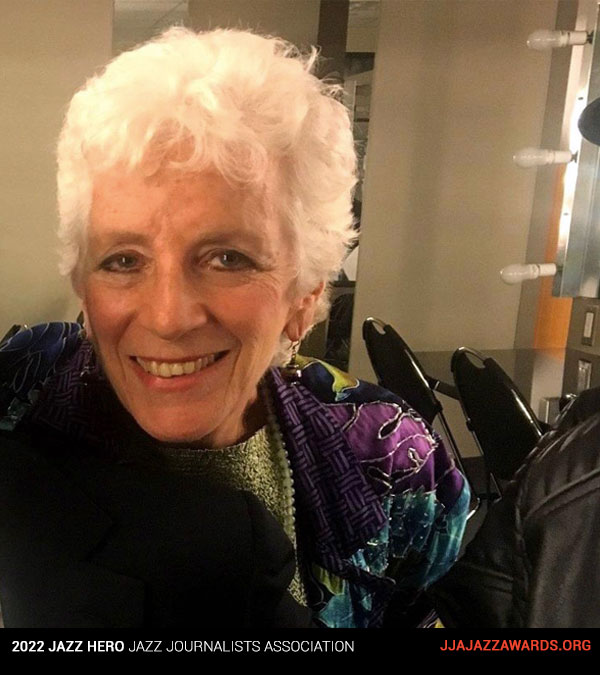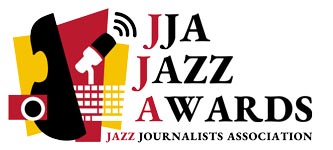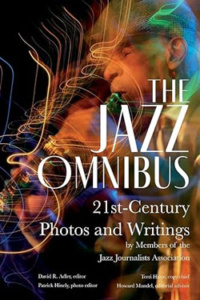New York City Jazz Hero

In 1987 Alina Bloomgarden invited Wynton Marsalis to help introduce jazz through a series of summer concerts to Lincoln Center of the Arts, New York City’s complex of venues for every other kind of performance. What they started became, in 1991, Jazz at Lincoln Center, which under Marsalis’s continued direction has comprised a world-touring orchestra, ongoing multi-stage programming, overall promotion and educational programs on jazz.
In itself, Bloomgarden’s conception and stewardship of nascent Jazz at Lincoln Center makes her a Jazz Hero. But over her longer career she has continued to initiate jazz-innovative projects. One was Reel to Real, 64 programs she produced at Lincoln Center pairing films and live performances to help children geared to watching videos segue into in-person events. One of the shows was about Louis Armstrong, and inspired her to another mission, incorporated as Music on the Inside, to engage people “impacted by incarceration” — disproportionately black men — with music while in prison and as a tool for rehabilitation and societal return. Alina Bloomgarden explained her response to an issue of pressing relevance in an interview by Gena Raps, originally published at PersimmonTree.
“I was impressed that Louis Armstrong had his first real music education at the Colored Waif’s Home for Boys, where he was sent after he was arrested on New Year’s Eve for shooting a gun with blanks. It was life-changing for him. First, he had three meals a day, which he hadn’t had as an indigent child. There was a music teacher and a boys’ band where he started playing the bugle. At first they had no use for him. They thought he wasn’t serious. Then they heard his sound and his natural talent. That was lifesaving for Armstrong.
“I thought, what are we doing for youth today? That was the genesis of Music on the Inside. I felt that musicians would want to help and it could really make a difference for the young people that we’re discarding. Now we teach both youths and adults affected by our criminal justice system. . . We want to give them something they can develop as skills and encouragement and a voice.
“It’s been mutually transformative for me and all the teachers who’ve taught and the people we’ve reached. We worked at Rikers Island for the first two years, in four different facilities for youth. Judy Gray came in with us and taught the blues. She would teach a simple 12-bar blues structure, and the young people would right away have something musical to say. So much to say, given half a chance!
“We’ve graduated to state facilities and work now in Queensboro Correctional Facility and Edgecombe Correctional Facility for men — adults returning from prison upstate, getting ready for re-entry. We started teaching guitar, singing and songwriting. It is amazing when you put an instrument in someone’s hand – it’s tremendously empowering. People’s concentration, focus and seriousness increase exponentially.
“Then we arranged with the facilities to have practice times. You can’t learn an instrument with a class once a week, and now they could practice. At the end of each semester we would have a performance for the whole population in the facility and feature our students and their teachers along with guest performers and other prominent musicians who would come in to perform.”
“In response to Covid-19, Music on the Inside pivoted to support for individuals in re-entry, and also presenting MOTI zoom concerts every Sunday featuring prominent, distinguished musicians alongside somebody who’s been affected by incarceration for whom music has been an abiding resource. We’re working with the Jazz Foundation of America — they’re helping to support our teachers with some of the musicians in their roster, giving meaningful work to people. It’s been a win-win, because musicians haven’t had the kinds of gigs they would normally have . . Covid has actually been beneficial for MOTI, in the sense that people are aware of what we’re doing. And it’s so timely, in terms of the country’s awareness of the issues of criminal justice.
“I always knew MOTI was a good idea, but only recently did I realize why music is so potent in this situation. People in prison are spoken down to and demeaned; a sense of their failures and inadequacy is reinforced over decades. All of a sudden they’re supposed to come out and build a successful life, get housing and a job.
“Music immediately creates an equal playing field. We’re just human beings making music together. We teach non-violent communication and talk about it, but with music, it just happens. There are many life skills implicit in making music that you need: discipline, focus and collaboration. There’s just so much in music that is imparted in an enjoyable way.”
The JJA hails Jazz Hero Alina Bloomgarden for institution building and educational programming, for helping individuals and strengthening communities, for applying the practices and precepts of jazz. — Howard Mandel, thanks to Gena Raps















